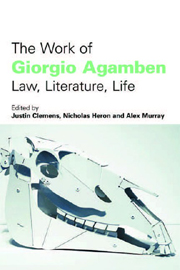Book contents
- Frontmatter
- Contents
- Acknowledgements
- Notes on Contributors
- The Enigma of Giorgio Agamben
- 1 K
- 2 Integral Actuality: On Giorgio Agamben's Idea of Prose
- 3 The Role of the Shifter and the Problem of Reference in Giorgio Agamben
- 4 ‘Its Silent Working was a Delusion’
- 5 Politics and Poetics of Divine Violence: On a Figure in Giorgio Agamben and Walter Benjamin
- 6 Idea of Poetry, Idea of Prose
- 7 The Fading Memory of Homo non Sacer
- 8 Soulblind, or On Profanation
- 9 Face to Face with Agamben; or, the Other in Love
- 10 Beyond Spectacle and the Image: the Poetics of Guy Debord and Agamben
- 11 Dismantling Theatricality: Aesthetics of Bare Life
- 12 Notes on Media and Biopolitics: ‘Notes on Gesture’
- Index
5 - Politics and Poetics of Divine Violence: On a Figure in Giorgio Agamben and Walter Benjamin
Published online by Cambridge University Press: 12 September 2012
- Frontmatter
- Contents
- Acknowledgements
- Notes on Contributors
- The Enigma of Giorgio Agamben
- 1 K
- 2 Integral Actuality: On Giorgio Agamben's Idea of Prose
- 3 The Role of the Shifter and the Problem of Reference in Giorgio Agamben
- 4 ‘Its Silent Working was a Delusion’
- 5 Politics and Poetics of Divine Violence: On a Figure in Giorgio Agamben and Walter Benjamin
- 6 Idea of Poetry, Idea of Prose
- 7 The Fading Memory of Homo non Sacer
- 8 Soulblind, or On Profanation
- 9 Face to Face with Agamben; or, the Other in Love
- 10 Beyond Spectacle and the Image: the Poetics of Guy Debord and Agamben
- 11 Dismantling Theatricality: Aesthetics of Bare Life
- 12 Notes on Media and Biopolitics: ‘Notes on Gesture’
- Index
Summary
DIVINE VIOLENCE
Walter Benjamin's essay ‘Critique of Violence’ is a foundational text for Giorgio Agamben's study of sovereign power because it lays bare the link between violence and law that is so important for Agamben's critical project. As Agamben observes, Benjamin understands this link as a dialectical oscillation between the violence that posits the law and the violence that preserves it. The aim of Benjamin's essay is to propose a third figure that would break the circularity of this dialectic. Agamben finds Benjamin's essay problematic, however, in that it leaves this figure largely undefined, suggesting even that it can't be recognised in the concrete case. Benjamin concentrates instead on the bearer of the link between violence and the law, bare life. All the more surprising, then, that Agamben's own work also largely leaves it unclear as to what form the divine violence that constitutes an alternative to the problems of modern sovereignty should take. What would be an example of an act of divine violence? How should one understand divine violence to break the circular dialectic between law-founding and law-preserving violence? And what remains of sovereignty and law after this break has been achieved? This essay seeks to address some of these questions through a comparative reading of the politico-poetic concept of divine violence in Agamben.
‘What is certain [about divine violence]’, Agamben writes in Homo Sacer: Sovereign Power and Bare Life, ‘is only that it neither posits or preserves law, but rather ‘de-poses’ (entsetzt) it.’ The break between law-positing and law-preserving violence that divine violence achieves creates a zone of indistinction between the two and introduces a politics liberated from the law.
- Type
- Chapter
- Information
- The Work of Giorgio AgambenLaw Literature Life, pp. 82 - 96Publisher: Edinburgh University PressPrint publication year: 2008



